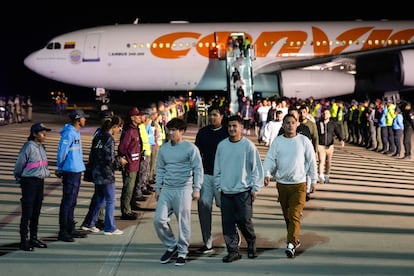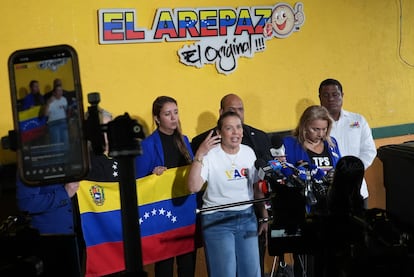‘They look for any excuse to get us’: Panic paralyzes Venezuelan migrant communities
Deportation fears intensify after Trump’s decision to end humanitarian parole, which has left 1.2 million people without legal protection


“What do I do? Go to the police and say, ‘Check my tattoos, I’m not a criminal’?” Nassi is in despair over reports of tattooed Venezuelan migrants being deported from the United States to a mega-prison in El Salvador because they are suspected of being members of Tren de Aragua, a criminal group that was started in Venezuela.
Nassi’s neck is covered in tattoos, as well as part of his arms. “I have some musical notes on my wrist. The Pisces sign and the Libra sign. I tattooed the little feet of my pitbull, who died. A compass. The Harry Potter lightning bolt. And I tattooed some scars I had on my neck to improve the way I look.”
He’s from Maracaibo, the country’s largest Western city, and a trained dancer. There, he taught urban dance classes to high school girls. First, he migrated to Peru, then traveled to Mexico. In July 2022, he turned himself into border patrol agents in Arizona in order to enter the United States. At the end of 2024, he received temporary permission to stay and work. It expires on April 7.
Today, Nassi lives in Nashville, Tennessee. For weeks, he hasn’t left his house except for gig work, and even then, he takes pains to hide himself. He’s stopped driving out of fear of being arrested by immigration agents or the state police, accused of a crime and forcibly deported, despite having followed the immigration regulations and procedures that were in force when he arrived. “I feel trapped. Every day, I think about leaving. I feel like my life is going to change at any moment and I want to know what to do.”
Venezuelan migrants without a green card or other permanent legal status are an easy target for immigration agents. Most of them arrived during the last decade as a consequence of humanitarian crisis and repression in Venezuela. Beginning in 2021, the administration of former president Joe Biden established mechanisms to allow them to stay legally in the country if they came seeking protection and refuge: temporary protected status (known by its initials, TPS, the program is now due to expire in April), humanitarian parole and immigratory processes that could be initiated via the cell phone application known as CBP One.
However, President Donald Trump repealed all of these permits, making over 1.2 million Venezuelans — who had been in the country with proper documentation and temporary protection from deportation — undocumented. While most have no criminal records, under the current administration, lacking a visa or legal status is considered a crime. The federal government has their names and addresses. Unlike other Latin American immigrants, they don’t have a consulate or embassy to turn to for legal help because the United States and Venezuela severed diplomatic ties in 2019. Arresting and deporting them is as easy as shooting fish in a barrel.

“Venezuelans feel persecuted, they’re looking for any excuse to get us. I didn’t think this was going to happen, that the president was going to be so radical,” say Nassi, who defines himself as “very right-wing.” Like so many other Venezuelans, he supported Trump’s re-election in the hopes that the politician would come down hard against Nicolás Maduro’s regime in Venezuela — not against migrants themselves. “We cannot vote, but most Venezuelans supported President Trump because we believed we would be protected and that Venezuela would be free. Now we are in a legal and human limbo,” Nassi says. “It’s hard to believe.”
What he fears most now is a swift and violent deportation, based on the 1798 Alien Enemies Act or the new Laken Riley law passed by Trump — both of which would deprive Nassi the opportunity to argue his case.
“What use is it to have a lawyer if not even a lawyer can intervene when they want to apply a law like Alien Enemies Act?” he asks. “What is going to happen in April when TPS expires if no judge will protect us? And what if a judge does protect us, but the government doesn’t care?”
Under the Alien Enemies Act, 238 Venezuelans were deported and detained at an El Salvador prison that has become a symbol of Nayib Bukele’s war against gangs, despite the fact that a judge had blocked the process, ordering the planes transporting the Venezuelans to return to the United States.
“The Venezuelan community is in a panic, especially those who don’t have their U.S. residency or citizenship. No one knows who could fall victim to being detained and end up in an El Salvador prison. With the Alien Enemies Act, there’s no right to due process, to self-defense,” says retired military officer José Colina, president of the organization Political Persecuted Venezuelans in Exile (Veppex).
The group is located in southern Florida, which is home to nearly 60% of the Venezuelans who arrived in the country during the last decade. He speaks of the fear he sees in every one of the messages he receives on a daily basis from immigrants asking what they can do to avoid deportation, what documents they should carry with them, what has happened with demands to reinstate the temporary permits.
According to the activist, the streets of cities like Doral, also known as Doralzuela, which used to be bustling with Venezuelans working or having fun, are quieter than usual. “You see solitude in the streets. The Venezuelan community does not have the same rhythm as a few months ago,” says Colina. “People don’t go out, they’re staying in their homes. The ones who are speaking out are us activists, who are constantly meeting in El Arepazo to see what actions we can take.”
At El Arepazo, the Venezuelan restaurant that is considered the heart of the exiled community, tables are no longer booked out at lunchtime.

“There’s also a general disappointment, because a good part of Venezuelans thought that Donald Trump was going to become president and remove Nicolás Maduro from power, and what is happening now is the opposite of that. He’s gone after the victims, not the victimizer,” says Colina.
Many Venezuelans are looking for an exit route, he continues, but they’re running into the problem of not having a current Venezuelan passport that allows them to travel to a third country and again, the country has no consulates in the United States where they can apply for a new one.
“They know the Venezuelan community is very weak,” says Colina. “We are the last to arrive, we have no political power or members in Congress, no senators or mayors. Our economic power is minimal, if we’re talking about honestly earned money. It is easier to deport a million Venezuelans without consequences than to deport a million Mexicans or a million Nicaraguans or a million Salvadorans. We have an enormous weakness and that is why they are mistreating us the way they are.”
Venezuelan journalist Ronna Rísquez, who has studied the Tren de Aragua and its operations since the group’s founding, is concerned by the lack of information that has been provided by the U.S. government about the supposed members of the organization who have been deported to El Salvador.
“I don’t understand how they can say that someone is guilty of something and not show proof, say what their crime is,” says Rísquez. “It’s true that a family member’s testimony is not overwhelming evidence to say that someone is not from Tren de Aragua, but neither have U.S. authorities provided proof that they are.”
Rísquez is also the author of the only published book on the criminal group, which is titled El Tren de Aragua: La banda que revolucionó el crimen organizado en América Latina (Tren de Aragua: The Group that Revolutionized Organized Crime in Latin America). Among the many things she has learned about the organization, she says, is the fact that tattoos have never served to identify its members.
Sign up for our weekly newsletter to get more English-language news coverage from EL PAÍS USA Edition
Tu suscripción se está usando en otro dispositivo
¿Quieres añadir otro usuario a tu suscripción?
Si continúas leyendo en este dispositivo, no se podrá leer en el otro.
FlechaTu suscripción se está usando en otro dispositivo y solo puedes acceder a EL PAÍS desde un dispositivo a la vez.
Si quieres compartir tu cuenta, cambia tu suscripción a la modalidad Premium, así podrás añadir otro usuario. Cada uno accederá con su propia cuenta de email, lo que os permitirá personalizar vuestra experiencia en EL PAÍS.
¿Tienes una suscripción de empresa? Accede aquí para contratar más cuentas.
En el caso de no saber quién está usando tu cuenta, te recomendamos cambiar tu contraseña aquí.
Si decides continuar compartiendo tu cuenta, este mensaje se mostrará en tu dispositivo y en el de la otra persona que está usando tu cuenta de forma indefinida, afectando a tu experiencia de lectura. Puedes consultar aquí los términos y condiciones de la suscripción digital.
